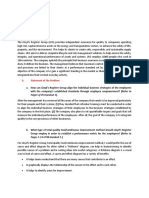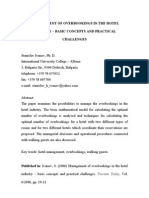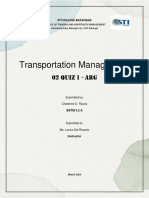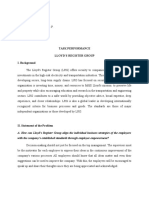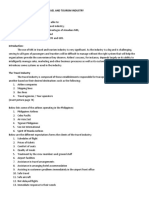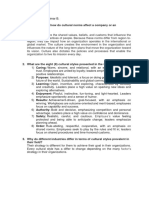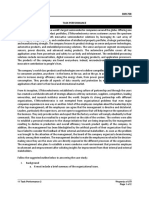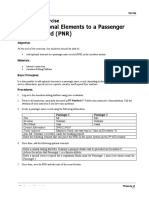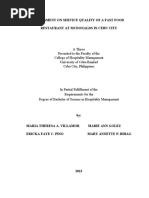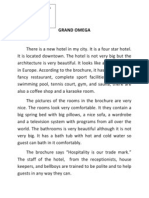The Indian Institute of Business Management & Studies: Case I Airline Commission Caps
The Indian Institute of Business Management & Studies: Case I Airline Commission Caps
Uploaded by
bobbyalamCopyright:
Available Formats
The Indian Institute of Business Management & Studies: Case I Airline Commission Caps
The Indian Institute of Business Management & Studies: Case I Airline Commission Caps
Uploaded by
bobbyalamOriginal Description:
Original Title
Copyright
Available Formats
Share this document
Did you find this document useful?
Is this content inappropriate?
Copyright:
Available Formats
The Indian Institute of Business Management & Studies: Case I Airline Commission Caps
The Indian Institute of Business Management & Studies: Case I Airline Commission Caps
Uploaded by
bobbyalamCopyright:
Available Formats
Subject: Hospitality Management.
The Indian Institute Of Business Management & Studies
Marks: 100
Case I Airline Commission Caps Travel agents have begun legal action and public campaigns to combat several airlines decisions to lower commissions for writing tickets, and have warned of higher ticket costs if other airlines follow. Most U.S. airlines have lowered the commission rate on tickets for domestic flights to a $20 cap for a round-trip fare. International commissions also fell and vary from airline to airline. As consumers begin to balk at rising ticket prices and Wall Street presses for continued earnings growth, airlines must cut costs by turning to their second largest expense, that $12 billion spent annually for costs such as travel agent commissions. It has become clear that airlines can do nothing about fuel prices and can do very little, if anything, about labor costs. The only area that airline management has any power over is the area of distinction expenses. American Express Corporate Services Agencies, which books mostly business travelers, warned that if other airlines follow suit, some travel agencies will go out of business. That would send more businesses to airlines reservation agents, who do not offer the lowest available fares from all carriers, or could result in travel agents passing costs along to consumers. The American Society of Travel Agents, which represent 24,000 agents, and The Association of Retail Travel Agents, a trade group that represents 4,000 travel agents, have announced they will seek U.S. congressional approval to allow small, business-sized travel agents to bargain collectively with the major airlines and to steer customers to friendly airlines when negotiating fails. The associations believe that the cut in commissions in less than three years is a slap in the face. After the introduction of the initial cap of $25 for one-way domestic tickets and $50 for round-trip tickets, many agents complained caps would eliminate jobs and reduce earnings. A class action lawsuit followed on behalf of 33,000 travel agents, alleging price fixing. Some travel agents also steered customers away from other airlines such as Delta in retaliation. In September 1996, American, Delta, Northwest, and United agreed to pay $72 million in cash to settle the lawsuit. Discussion Questions 1. If you owned a travel agency, what would your reaction to the reduced commission cap be? 2. What options would you consider?
Subject: Hospitality Management.
The Indian Institute Of Business Management & Studies
Marks: 100
Case II Developing the San Diego Waterfront San Diego, California, has a diversified economic base with tourism as an important component of the economy. The city hosts about 18 million tourists who spent some $6 billion, and tourism is steadily expanding each year. Most tourists are domestic, although a fair number of foreigners also visit the city. The attractions for tourists in San Diego are the mild Mediterranean-type climate; attractive natural setting; beaches developed with resort and park facilities; and major attractions including Sea World, the world-famous San Diego Zoo and Wild Animal Park, interesting and well-preserved historic areas, and picturesque shopping districts. A variety of resort and urban hotels have been developed, the most notable being the historic Hotel del Coronado. The policy of government, which is supported by most residents, is for the continued but controlled development of tourism as a major source of income and employment. A major focal point for tourism development is the downtown area located next to the waterfront of San Diego Bay. As a result of concerted planning efforts and substantial investment during the past several years, the San Diego downtown is undergoing new development and redevelopment. Changes include a recently completed convention center; the preservation and renovation of numerous shops and restaurants in the historical Gaslamp Quarter; the development of a maritime museum on the waterfront of historic ships; the Seaport Village shopping and restaurant complex and related park, also located on the waterfront; and others. New urban residential complexes are also developing. In response to the revitalization of downtown, several new high-rise hotels have been developed and some historic hotels have been renovated to provide good quality tourist facilities. Many conferences and conventions are now being attracted to the downtown and this area, with its interesting features, has become an important center for tourism for both business conferences and holiday tourists. San Diego recognizes the importance of its waterfront and the views it affords as a major attraction for both residents and tourists. If properly conserved and carefully developed, waterfronts give an urban area a unique character. However, in the case of San Diego, and some other cities, the economic pressure to develop prime waterfront sites can lead to cutting off public access to the waterfront, thereby preempting waterfront areas from public use and blocking views of the water from inland downtown buildings. In San Diego, the new convention canter already stretches along a considerable length of the waterfront and plans are to expand it further along this area. New high-rise hotels near the convention center are blocking waterfront access and views of the bay, and more hotels have been proposed for this area. Expansion is planned for the popular Seaport Village, however this complex is low rise and does not greatly impinge on views. It is designed to provide pedestrian access along the waterfront. Other projects are being considered for development on the waterfront. Thus, there is the dilemma of the waterfront area, the most significant natural feature of the downtown environment,
Subject: Hospitality Management.
The Indian Institute Of Business Management & Studies
Marks: 100
not being effectively integrated into development patterns because of economic development pressures. At the same time, many persons recognize the need to preserve public access, use of the waterfront, and views of the bay. The problem relates particularly to the need for careful land-use planning with utmost consideration given to social and economic implications. Discussion Questions 1. Why is it considered so desirable to develop public and private amenity features on the waterfront and preserve public access to the waterfront and water views in urban area? From the residents standpoint? From the standpoint of developing successful tourism? 2. What approach can San Diego take in properly developing its downtown waterfront area both to achieve economic development objectives and to preserve access to and along the waterfront and views of the adjacent bay? 3. If the choice of development of a particular waterfront site lies between developing the site for a high-rise hotel, for which there is proven market demand, or a waterfront public park for use by both residents and tourists, which do you think is the best use of the site? What approaches could be applied to achieve both objectives?
Subject: Hospitality Management.
The Indian Institute Of Business Management & Studies
Marks: 100
Case III To Flag or Not to Flagand If So, Which Flag? Joy and Bob Brown retired from the military in 1995. They bought a motel near a picturesque New England town. The Cozy Motel is clearly visible and easily accessible from the turnpike. It has seventy-five rooms that are in good shape, having just been refurbished, and the curbside appeal of fresh paint and attractive landscaping adds to the motels presentation. The motels year-round occupancy is 58 percent, which is about 10 percentage points below the national average. The average daily rate is $38. The Cozy Motels guests are a mix of business travelers, who are mostly from companies at the nearby business park; a few retires traveling for pleasure; an occasional bus tour; and some sports teams. The Browns have asked several major franchise corporations to submit their best offers. The best one indicates that the cost of a franchise application fee is $20,000, and that there is a 2 percent revenue marketing fee and a reservation fee of $4 per room booked by the Central Reservation System (CRS). Discussion Questions 1. What would you do in the Browns situation? Should they sign a franchise agreement or not? Make assumptions, if needed. 2. What terms and conditions of a franchise agreement would be acceptable to you, or to the Browns? 3. What additional information would you, or the Browns, need to know?
Subject: Hospitality Management.
The Indian Institute Of Business Management & Studies
Marks: 100
Case IV Checking Out a Guest A guest walked up to the front desk agent in an upscale hotel, ready to check out. As she would normally do when checking out a guest, the agent asked the guest what his room number was. The guest was in a hurry and showed his anxiety by responding, I stay in a hundred hotel rooms and you expect me to remember my room number? The agent then asked for the guests name, to which he responded, My name is Mr. Johnstein. After thanking him, the agent began to look for the guests last name, but the name was not listed in the computer. Because the man had a heavy accent and the agent assumed that she had misunderstood him, she politely asked the guest to spell his last name. He answered, What? Are you an idiot? The person who checked me in last night had no problem checking me in. Again, the agent looked on the computer to find the guest. The guest, becoming even more frustrated, said, I have a plane to catch and it is ridiculous that it has to take this long to check me out. I also need to fax these papers off, but I need to have them photocopied first. The agent responded, There is a business center at the end of the counter that will fax and photocopy what you for it. Havent you ever heard of customer service? Isnt this a five-star hotel? With your bad attitude, you should be working in a three-star hotel. I cant believe they let you work here at the front desk. Havent you found my name yet? The agent, who was beginning to get upset, asked the guest again to spell out his full name. The guest only replied, Here are my papers I want faxed if you are capable of faxing them. The agent reached to take the papers, and the guest shouted, Dont grab them from my hand! You have a bad attitude, and if I had more time, I would talk to someone about getting you removed from your position to a hotel where they dont require such a level of customer service. The agent was very upset, but kept herself calm in order to prevent the guest from getting angrier. The agent continued to provide service to the guest, sending the faxes and making the photocopies he had requested. Upon her return, the agent again asked the guest to repeat his last name, since he had failed to spell it out. The guest replied by spelling out his name, J-o-h-n-s-t-o-n-e. The agent was finally able to find his name on the computer and checked him out, while he continued to verbally attack her. The agent finished by telling the guest to have a nice flight.
Subject: Hospitality Management.
The Indian Institute Of Business Management & Studies
Marks: 100
Discussion Questions 1. Is it appropriate to have the manager finish the check-out? Or, should the front desk agent just take the heat? 2. Would you have handled the situation in the same manner? 3. What would you have done differently?
Subject: Hospitality Management.
The Indian Institute Of Business Management & Studies
Marks: 100
Case V Overbooked: The Housekeeping Perspective It is on secret that in all hotels, the director of housekeeping must be able to react quickly and efficiently to any unexpected circumstances that arise. Stephen Rodondi, executive housekeeper at the Regency in La Jolla, California, usually starts his workday at 8.00 A.M. with a department meeting. These morning meetings help him, and the employees, to visualize their goals for the day. On this particularly busy day, Rodondi arrives at work and is told that three housekeepers have called in sick. This is a serious challenge for the hotel because it is overbooked and has all of its 400 rooms to service. Discussion Questions 1. What should Stephen do to maintain standards and ensure that all the guest rooms are serviced?
Subject: Hospitality Management.
The Indian Institute Of Business Management & Studies
Marks: 100
Case VI Overbooked: The Front Office Perspective Overbooking is an accepted hotel and airline practice. Many question the practice from various standpoints including ethical and moral. Industry executives argue that there is nothing more perishable than a vacant room. If it is not used, there is no chance to regain lost revenue. Hotels need to protect themselves because potential guests frequently make reservations at more than one hotel or are delayed and, therefore, do not show up. The percentage of no-shows varies by hotel and location, but is often around 5 percent. In a 400-room hotel, that is twenty rooms, or an average loss of approximately $2,600 per night. Considering these figures, it is not surprising that hotels try to protect themselves by overbooking. Hotels look carefully at bookings: Who they are for, what rates they are paying, when they were made, whether they are for regular guests or from a major account (a corporation who uses the hotel frequently), etc. Jill Reynolds, the front office manager at the Regency La Jolla, had known for some time that the 400-room hotel would be overbooked for this one night in October. She prepared to talk with the front desk associates as they came on duty at 7:30 in the morning, knowing it would be a challenge to sell out without walking guests. Seldom does a hotel sell out before having to walk a few guests. The hotels policy and procedure on walking guests enables the front desk associates to call nearby hotels of a similar category to find out if they have rooms available to sell. If it is necessary to walk a guest, the associate explains to the guest that, regrettably, no rooms are available due to fewer departures thane expected. The associate must explain that suitable accommodations have been reserved at a nearby hotel and that the hotel will be pay for the room and transportation to and from the hotel. Normally guests are understanding, especially when they realize that they are receiving a free room and free transportation. On this particular day, the house count indicated that the hotel was over booked by thirty rooms. Three or four nearby, comparable hotels had rooms available to sell in the morning. Besides walking guests, Jill considered other options, in particular splitting the fifteen suites with connecting parlors. If the guests in the suites do not need the parlor, it is then possible to gain a few more room to sell separately, however roll-away beds must be placed in the rooms. Fortunately, eight parlors were available to sell. Discussion Question 1. If you were in the same situation, what would you do?
You might also like
- Heisman Dan, World's Most Instructive Amateur Game Book PDFDocument405 pagesHeisman Dan, World's Most Instructive Amateur Game Book PDFgin hoo89% (9)
- Staking Plans PDFDocument47 pagesStaking Plans PDFMarcio1549260100% (1)
- Module 9 AssignmentDocument4 pagesModule 9 AssignmentJessica TurnerNo ratings yet
- The One Death & Dismemberment PDFDocument3 pagesThe One Death & Dismemberment PDFÁlvaro Bustos JuradoNo ratings yet
- Hays-Combination Challenge - 2113 Chess Puzzles To SOLVE - BWC PDFDocument352 pagesHays-Combination Challenge - 2113 Chess Puzzles To SOLVE - BWC PDFpablomatus86% (7)
- Lloyd's Register GroupDocument6 pagesLloyd's Register GroupRhegina Mariztelle ForteNo ratings yet
- CASE STUDY Golden Plaza HotelDocument1 pageCASE STUDY Golden Plaza HotelhotgirlsummerNo ratings yet
- Management of Overbookings in The Hotel Industry - Basic Concepts and Practical ChallengesDocument27 pagesManagement of Overbookings in The Hotel Industry - Basic Concepts and Practical ChallengesStanislav IvanovNo ratings yet
- QSM CasesDocument5 pagesQSM CasesJenny A. LiwanagNo ratings yet
- Service GuaranteeDocument13 pagesService GuaranteeshraddhapagalNo ratings yet
- 08 Task PerformanceDocument1 page08 Task PerformanceMiseu BoonNo ratings yet
- 02 Quiz 1 - ARG - Rayos - Chaterine - BSTM3.2A - TranspoDocument3 pages02 Quiz 1 - ARG - Rayos - Chaterine - BSTM3.2A - TranspoChaterine RayosNo ratings yet
- 02 Quiz 1Document1 page02 Quiz 1Monaliza PepitoNo ratings yet
- TPPD IndividualDocument1 pageTPPD IndividualRosewycherly AysonNo ratings yet
- Case Study 1Document4 pagesCase Study 1Jonas Marvin Anaque0% (1)
- 09 Quiz 01 Instructions: Based On The Inhibitor of Empowerment Your Group Is Assigned With, Come UpDocument1 page09 Quiz 01 Instructions: Based On The Inhibitor of Empowerment Your Group Is Assigned With, Come Upnyx luxNo ratings yet
- Case Analysis Current TrendsDocument4 pagesCase Analysis Current TrendsCherry Jana RobianesNo ratings yet
- Syrategic Management Paper FormatDocument6 pagesSyrategic Management Paper FormatAhvu PanerNo ratings yet
- Activity 1 - Strategic - ManagementDocument1 pageActivity 1 - Strategic - ManagementLeiann Pongos0% (1)
- Task Performance Lloyd'S Register Group I. BackgroundDocument3 pagesTask Performance Lloyd'S Register Group I. BackgroundPrincess OclaritNo ratings yet
- Formative Assessment: Instructions: Read Carefully The Case and Answer The Questions Below Comprehensively. Case Study #1Document2 pagesFormative Assessment: Instructions: Read Carefully The Case and Answer The Questions Below Comprehensively. Case Study #1Kimberly Gabatan0% (1)
- PDAE Handout1Document3 pagesPDAE Handout1Joana LirioNo ratings yet
- "KRMD Souvenirs": in Partial Fulfilment of The Final Requirement in Entrepreneurship and Business PlanningDocument28 pages"KRMD Souvenirs": in Partial Fulfilment of The Final Requirement in Entrepreneurship and Business PlanningJuzetteValerieSarceNo ratings yet
- How Did The Cabin Crew Handle The Issues in Both Cases 1st CaseDocument3 pagesHow Did The Cabin Crew Handle The Issues in Both Cases 1st CaseeymiNo ratings yet
- 05 Activity 1 Answer KeyDocument1 page05 Activity 1 Answer KeyYvonne Mae TeopeNo ratings yet
- Chapter 5Document5 pagesChapter 5setsuna9993No ratings yet
- Case 1 WalmartDocument2 pagesCase 1 Walmartijustateanapple100% (2)
- Chapter 16 - JIT and Lean OperationsDocument62 pagesChapter 16 - JIT and Lean OperationsGennia Mae MartinezNo ratings yet
- in Your Opinion, How Do Cultural Norms Affect A Company or An Organization?Document1 pagein Your Opinion, How Do Cultural Norms Affect A Company or An Organization?Danimar BaculotNo ratings yet
- Servicescape: Prepared By:-Sandeep Kumar Mba 2 YearDocument11 pagesServicescape: Prepared By:-Sandeep Kumar Mba 2 YearSandeep SinghNo ratings yet
- CinderellaDocument1 pageCinderellaDahyun KimNo ratings yet
- The Contemporary World: 02 Worksheet 2Document9 pagesThe Contemporary World: 02 Worksheet 2Ashley AcuñaNo ratings yet
- PAREDES QMS 05 Homework 1 ARGDocument3 pagesPAREDES QMS 05 Homework 1 ARGEmmanuel Gomez de Peralta Jr.No ratings yet
- Quindatan IntegrityDocument1 pageQuindatan IntegrityKhris Espinili AlgaraNo ratings yet
- 11 Task Performance 2 PDFDocument2 pages11 Task Performance 2 PDFCristopher Rico DelgadoNo ratings yet
- Westover Case StudyDocument2 pagesWestover Case StudyMohamad ELyas100% (2)
- Cruise Line Industry 2017Document20 pagesCruise Line Industry 2017Sarah Auckland100% (2)
- On-The-Job Training at The Days Hotel - Tagaytay CityDocument16 pagesOn-The-Job Training at The Days Hotel - Tagaytay CityChelsea GardayaNo ratings yet
- Flight Op Management MIDTERM TPDocument5 pagesFlight Op Management MIDTERM TPAnatano NamaewaNo ratings yet
- 01 Activity 1Document1 page01 Activity 1Jell BesasNo ratings yet
- The Contemporary World Midterm Task PerformanceDocument1 pageThe Contemporary World Midterm Task PerformanceMerlin SuNo ratings yet
- QSM ActivitiesDocument31 pagesQSM ActivitiesROLAND DUCUSIN MARCOSNo ratings yet
- Mendoza, Alaisa S. BSTM 3A Compare & ContrastDocument1 pageMendoza, Alaisa S. BSTM 3A Compare & ContrastAlaisa MendozaNo ratings yet
- 07 Laboratory Exercise 1 - ARGDocument2 pages07 Laboratory Exercise 1 - ARGShania GualbertoNo ratings yet
- 04 Review 1 - ARGDocument1 page04 Review 1 - ARGDK PanganibanNo ratings yet
- Updated Case Westover ElectricalDocument8 pagesUpdated Case Westover ElectricalRalph Adrian MielNo ratings yet
- Facility and Work Design: Operations ManagementDocument28 pagesFacility and Work Design: Operations Managementaquinochristinejamela2005No ratings yet
- Assessment On Service Quality of A Fast Food Restaurant at Mcdonalds in Cebu CityDocument8 pagesAssessment On Service Quality of A Fast Food Restaurant at Mcdonalds in Cebu CityEricka Faye C. PinoNo ratings yet
- Henry SyDocument24 pagesHenry SyJoemel DizonNo ratings yet
- Service Failure and Recovery Questionnaire EnglishDocument22 pagesService Failure and Recovery Questionnaire EnglishAli AslamNo ratings yet
- 05 Laboratory Exercise 1: Sponsorship Letter, Packages and ContractsDocument8 pages05 Laboratory Exercise 1: Sponsorship Letter, Packages and ContractsAya ManaigNo ratings yet
- Impact of Coconut Production On The Environment and The Problems Faced by Coconut Producers in Lanao Del Norte Province, PhilippinesDocument13 pagesImpact of Coconut Production On The Environment and The Problems Faced by Coconut Producers in Lanao Del Norte Province, PhilippinesCaryl Louise ObcianaNo ratings yet
- 08 Activity 1 EntrepDocument1 page08 Activity 1 EntrepJaydee Anne RiveraNo ratings yet
- SWOT ANAYLYSIS Final - OdtDocument2 pagesSWOT ANAYLYSIS Final - OdtuahproductionsNo ratings yet
- 01 - Applied Task Performance FinalDocument4 pages01 - Applied Task Performance FinalLie Cabrera MarquezNo ratings yet
- FranchisingDocument2 pagesFranchisingJoel Christian MascariñaNo ratings yet
- 05 Quiz 1Document1 page05 Quiz 1J A.No ratings yet
- The Background of Walmart Marketing EssayDocument7 pagesThe Background of Walmart Marketing EssayHND Assignment HelpNo ratings yet
- Ethical Issue Surrounding The Hospitality and Tourism Industry in The PhilippinesDocument4 pagesEthical Issue Surrounding The Hospitality and Tourism Industry in The PhilippinesJeric LargoNo ratings yet
- Book Reviews 3rddraft 12 3Document22 pagesBook Reviews 3rddraft 12 3Aya De LeonNo ratings yet
- 04 Quiz 1Document1 page04 Quiz 1Juan AlcantaraNo ratings yet
- 02 Exercise Laboratory 1 TOURPLANNINGDocument8 pages02 Exercise Laboratory 1 TOURPLANNINGnicole dordeNo ratings yet
- Project On International BusinessDocument18 pagesProject On International BusinessAmrita Bharaj50% (2)
- HS101 CH10,11,13,14,17Document13 pagesHS101 CH10,11,13,14,17Austin KeungNo ratings yet
- FIFA Modified RulesDocument3 pagesFIFA Modified RulesKevin StreeteNo ratings yet
- The Armstrong WorkoutDocument3 pagesThe Armstrong WorkoutAlanNo ratings yet
- Joined Investiture Ceremony For BOY AND SENIOR SCOUT SECTION SHORTDocument9 pagesJoined Investiture Ceremony For BOY AND SENIOR SCOUT SECTION SHORTArvin SeraniasNo ratings yet
- Crunchy FUDGEDocument7 pagesCrunchy FUDGEbobyNo ratings yet
- Bruno Mars - Treasure Lyrics - MetrolyricsDocument16 pagesBruno Mars - Treasure Lyrics - MetrolyricswawanwendyNo ratings yet
- Tavern TablesDocument8 pagesTavern TablesHannah LipskyNo ratings yet
- Atlanta Civic CenterDocument2 pagesAtlanta Civic CenterM. KorhonenNo ratings yet
- Dungeon of Terror (Setup Definition: EMPTY SPACEDocument2 pagesDungeon of Terror (Setup Definition: EMPTY SPACEfreemallocNo ratings yet
- The Fischer-Spassky GamesDocument131 pagesThe Fischer-Spassky GamesAnonymous kielG2100% (6)
- Advantages of TelevisionDocument10 pagesAdvantages of TelevisionjoylynchocoloveNo ratings yet
- Literacy Narrative Enc 1101Document6 pagesLiteracy Narrative Enc 1101api-242332162No ratings yet
- LotFP Character Sheet As Conceived by Last GaspDocument4 pagesLotFP Character Sheet As Conceived by Last Gasppacalypse100% (1)
- H Vs Feasibility StudyDocument170 pagesH Vs Feasibility StudyBagus Deddy AndriNo ratings yet
- Druid - Circle of The Moon - v5.0Document1 pageDruid - Circle of The Moon - v5.0ECO SpeedsNo ratings yet
- Warhammer Quest SummaryDocument2 pagesWarhammer Quest Summaryhigherdepths100% (2)
- DF Rules enDocument2 pagesDF Rules enJONYghostNo ratings yet
- Preview ¿Indefinido o Imperfecto ?Document18 pagesPreview ¿Indefinido o Imperfecto ?swatson033No ratings yet
- Grand OmegaDocument3 pagesGrand OmegaSierrajwr BelanjaNo ratings yet
- EBSL Nazare 2017 - Media GuideDocument22 pagesEBSL Nazare 2017 - Media GuideBeach Soccer MediaNo ratings yet
- Table Tennis Ground RulesDocument2 pagesTable Tennis Ground RulesChandan Gupta100% (1)
- Modele Abordare in RecruitingDocument7 pagesModele Abordare in RecruitingDaniela MunteanuNo ratings yet
- CircularDocument4 pagesCircularGyan SinghNo ratings yet
- GRM2PF5NS 1Document1 pageGRM2PF5NS 1patbug24No ratings yet
- Gamasutra: Radek Koncewicz's Blog - 10 Ways in Which Sonic The Hedgehog Wasn't About SpeedDocument9 pagesGamasutra: Radek Koncewicz's Blog - 10 Ways in Which Sonic The Hedgehog Wasn't About SpeedMyNameNo ratings yet
- PROBABILITYDocument8 pagesPROBABILITYalmiraNo ratings yet
- Fabula Ultima Character SheetDocument3 pagesFabula Ultima Character Sheetethan.f.riordanNo ratings yet





